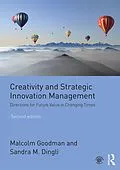Creativity and Strategic Innovation Management was the first book to integrate innovation management with both change management and creativity to form an innovative guide to survival in rapidly changing market conditions. Treating creativity as the process, and innovation the result, Goodman and Dingli emphasise the importance of a strategic approach to management through fostering creative processes.
Revised and updated for a second edition, this ground-breaking book now includes:
- A new section on contemporary themes in innovation management, such as the use of social media and sustainability.
- More coverage of entrepreneurship, ethics, diversity issues and the legal aspects of technology and innovation management.
- More international cases and real life examples.
The book is also supported by a range of new tutor support materials.
This textbook is an ideal accompaniment to postgraduate courses on innovation management and creativity management. The focused approach by Goodman and Dingli also makes it useful as supplementary reading on a range of courses from management of technology to strategic management.
Autorentext
Malcolm Goodman is Senior Teaching Fellow at Durham University, UK.
Sandra M. Dingli is Associate Professor at The Edward de Bono Institute for the Design & Development of Thinking, University of Malta, Malta.
Zusammenfassung
Creativity and Strategic Innovation Management was the first book to integrate innovation management with both change management and creativity to form an innovative guide to survival in rapidly changing market conditions. Treating creativity as the process, and innovation the result, Goodman and Dingli emphasise the importance of a strategic approach to management through fostering creative processes.Revised and updated for a second edition, this ground-breaking book now includes: A new section on contemporary themes in innovation management, such as the use of social media and sustainability. More coverage of entrepreneurship, ethics, diversity issues and the legal aspects of technology and innovation management. More international cases and real life examples.The book is also supported by a range of new tutor support materials. This textbook is an ideal accompaniment to postgraduate courses on innovation management and creativity management. The focused approach by Goodman and Dingli also makes it useful as supplementary reading on a range of courses from management of technology to strategic management.
Inhalt
Table of Contents
PART I
The challenge of changing times
1 The changing business environment
Learning objectives
Introduction
Context
What is change?
Understanding the causes of change
Socio-cultural forces
Economic forces
Technological trends
Environmental
Cause, effect and apprehension
Complexity and change
Key principles
Creating wealth
Factors of production
Creativity
What is creativity?
Consequences of the business paradigm shift
Types of change
Incremental change
Transitional change
Transformational change
Change drivers
Practice
Business paradigms
Marketing and management myopia
Least cost production paradigm
Marketing paradigm
Customer-perceived value paradigm
Service dominant logic paradigm
Post-capitalist paradigm
Action
Backwards or forward into the future?
The challenge of change
Challenges of initiating change
Challenges of sustaining momentum
Challenges of system-wide thinking
Challenge to traditional management
Summary
Discussion questions
Case exercise
Nokia 1 Early success in the mobile phone industry
References
Selected YouTubes
2 Key business decisions
Learning objectives
Introduction
Context
Time frame decisions
Information overload
Shareholder , finance and government pressure
Shortening business life-cycles
Feel or process?
Key principles
Business decision process
Rational model
Real world complications
Contingency approach
Concepts of efficiency and effectiveness
The S-curve
Three strategic approaches
Limpet strategy
Cautious strategy
Innovative strategy
Practice
Two key questions
Concept of customer-perceived value revisited
Managing bias
Action
Making decisions - blending knowledge with experience to achieve know-how
Linking creativity, entrepreneurship and innovation
Summary
Discussion questions
Case exercise
Tyrell's - When the chips are down raise a glass!
References
Selected YouTubes
3 Management revisited
Learning objectives
Introduction
Horse sense!
Context
Global business environment
Key principles
A divertimento
Defining management
Primary management processes
Redefining management action - control or lead?
Putting the emphasis on control
Putting the emphasis on leadership
Management: quo vadis?
Practice
Essential management skills
Managing self and individuals
Managing groups
Managing an organisation
Ethical considerations
Broad management styles
Organisational development
Is there a correct style?
Japanese management approach
Japanese management culture
Japanese management techniques
Theory Z
Quality of Work life
Quality circles
Action
New skills for a new world
Summary
Discussion questions
Case exercise
SASOL
References
Selected YouTube videos
PART II
Innovation from theory to practice
1 Business creativity
Learning objectives
Introduction
Nasruddin
Context
What is creativity?
Definitions
Process
Generate ideas
Creative people
Strive for originality
Provide examples of their work
Key principles
Understanding thinking
Physiology of the brain
The working brain - a synaptic wonder
Practice
Contextual factors affecting personal creativity
Organisations and creativity
Expressing natural skills
Action
Assessing personal creative potential
Personal Creativity Audit
Personal creativity in action
Work environment and performance
Left brain and right brain thinking model
Learning skills
Introducing the Total Thinking model
Perception
Half-brained thinkers!
Creative thinking applications
Summary
Discussion questions
Exercises
Sexism
Beijing Express problem
References
Selected YouTubes
Appendices
CPS Toolbox notes
5 Applied business creativity
Learning objectives
Introduction
Context
Challenge of change
Stimulating creative thinking
Creativity and intelligence
Key principles
The Quick-Fix approach
The creative problem solving approach
Note-taking skills
Memory friendly information
Learning skills
Picture perspectives
Getting to grips with Creative Individual Problem Solving
Demonstrat…
